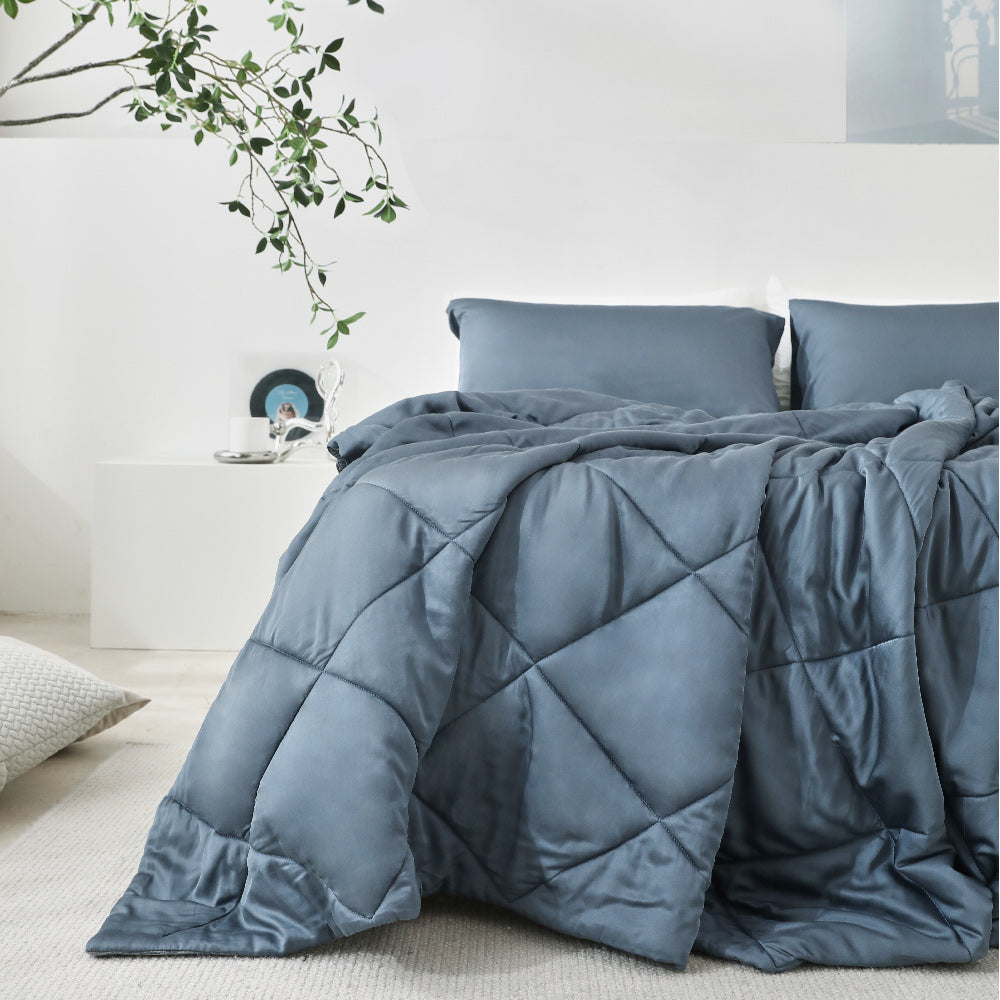It was a wonderful night, you fall asleep in a comfortable temperature, diving into your sweet dream. Several hours later, you wake up drenched in sweat. Sometimes, your pajama is soaked and you may even feel the need to change the sheets. What a night mere! Sweating while sleeping is a relatively common complaint, affecting people of different ages and genders. A survey found that 10% to 40% adults reported their night sweat to their primary care doctors at least occasionally.

How sweat affects your sleep?
Most people prefer to sleep in a slightly cool environment, and will use a blanket or other methods to achieve the desired temperature. However, if you wake up feeling too hot or too cold, it indicates that the temperature of your sleep environment is not ideal. Uncomfortable temperatures can lead to a range of potential harms for your sleep, including:
Increased Heat- Sweating can increase the heat of the body, making it harder to fall asleep and stay asleep. This is because the body needs to cool down in order to enter a relaxed state.
Discomfort- Sweating can cause discomfort to the skin, creating an uncomfortable environment that can make it difficult to sleep. This discomfort can be caused by sweat sticking to the skin, or from the feeling of dampness.
Pores blocked- When you sweat, your body's not just losing water. Sebum (oil) and dead skin also exit through your pores, your pores could become blocked and get irritated.
Skin Irritation- Sweating may cause irritation to the skin, which can further disrupt sleep. This irritation may be caused by a combination of sweat and bacteria on the skin.
Odor- Sweating can create an unpleasant odor that may be distracting or unpleasant, preventing a person from falling asleep.
Stress- Sweating can be a sign of stress, which can also cause difficulty sleeping. Stress is known to affect the body’s ability to fall asleep and stay asleep.
Dehydration- Sweating can lead to dehydration, which can cause fatigue and make it more difficult to fall asleep. Dehydration can also lead to headaches, which can further interfere with sleep.

Why you sweat in your sleep?
Night sweats are a common occurrence, and can be caused by a variety of factors. Sleeping in a warm or hot environment is the most common reason for night sweats, as it is normal to sweat while asleep if your bedroom is overly warm, you are wearing heavy pajamas, or you are sleeping under a thick blanket. Other potential causes of night sweats include anxiety and nightmares, changes in hormones, and other inner body changes.
Physical Activity- People may sweat during sleep due to physical activity. This could include thrashing around in bed or even having a dream that causes physical movement.
Changes in Body Temperature- Sweating can be a natural response to changes in body temperature. When the body gets too hot, it will release sweat to cool down.
Stress or Anxiety-Stress and anxiety can cause people to sweat during sleep. This is due to the body releasing hormones that cause the body to sweat.
Hormonal Changes-Hormonal changes can cause people to sweat during sleep. This is especially common during puberty or menopause, when hormone levels can fluctuate.
Medications- Certain medications can cause people to sweat during sleep. This is due to the medications affecting the body’s ability to regulate temperature.
Medical Conditions-Sweating during sleep can be a symptom of certain medical conditions, such as diabetes, hyperthyroidism, and certain infections.
If you suspect your night sweats are due to an infection or other illness, seek medical attention immediately. Talk to your doctor for more information regarding your condition, available treatment options, and ways to prevent future night sweats.
How can sweats be prevented and removed during sleep?
Keep your bedroom cool- To prevent night sweat, the first thing to do is adjusting your room temperature. It’s tricky, because the temperature that makes you feel the most comfortable for falling asleep may not be the most comfortable for staying asleep.
Wear breathable and loose pajamas- These fabrics help keep your body temperature regulated and reduce sweating.
Try relaxation techniques: Stress and anxiety can lead to night sweats. Try relaxation techniques such as yoga or deep breathing to help reduce stress.
Exercise regularly- Regular exercise can help keep your body temperature regulated and reduce sweating.
Use antiperspirants: Antiperspirants can help reduce sweating by blocking sweat glands. Antiperspirants can be healthy when used as directed, but remember, overuse of antiperspirants can lead to skin irritation.
Take cool showers- Always take a warm shower immediately after your workout. Taking cool showers can help reduce body temperature and reduce sweating.
Keep the airflow-If you’re not able to keep your bedroom that cool, you can try adding a strategically placed fan, open the window to add the airflow and keep the body dry and cool.
Use absorbent bedding: Using absorbent bedding made from breathable fabric like cotton and bamboo can help wick away sweat from your body.
Conclusion
In conclusion, sweating is a natural, healthy process that helps regulate body temperature and maintain homeostasis. Although it can be uncomfortable and unpleasant, there are many ways to manage it. Proper hydration, stress management, and exercise can all help reduce sweat production and make it easier to cope with. By understanding the causes of sweat and how to cope with it, you can find ways to stay comfortable and confident in any situation.


